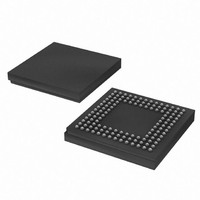XC3S500E-4CPG132C Xilinx Inc, XC3S500E-4CPG132C Datasheet - Page 26

XC3S500E-4CPG132C
Manufacturer Part Number
XC3S500E-4CPG132C
Description
FPGA Spartan®-3E Family 500K Gates 10476 Cells 572MHz 90nm (CMOS) Technology 1.2V 132-Pin CSBGA
Manufacturer
Xilinx Inc
Series
Spartan™-3Er
Datasheet
1.XC3S100E-4VQG100C.pdf
(233 pages)
Specifications of XC3S500E-4CPG132C
Package
132CSBGA
Family Name
Spartan®-3E
Device Logic Cells
10476
Device Logic Units
1164
Device System Gates
500000
Number Of Registers
9312
Maximum Internal Frequency
572 MHz
Typical Operating Supply Voltage
1.2 V
Maximum Number Of User I/os
92
Ram Bits
368640
Number Of Logic Elements/cells
10476
Number Of Labs/clbs
1164
Total Ram Bits
368640
Number Of I /o
92
Number Of Gates
500000
Voltage - Supply
1.14 V ~ 1.26 V
Mounting Type
Surface Mount
Operating Temperature
0°C ~ 85°C
Package / Case
132-TFBGA, CSPBGA
Lead Free Status / RoHS Status
Lead free / RoHS Compliant
For Use With
122-1536 - KIT STARTER SPARTAN-3E
Lead Free Status / RoHS Status
Lead free / RoHS Compliant
Other names
122-1484
Available stocks
Company
Part Number
Manufacturer
Quantity
Price
Company:
Part Number:
XC3S500E-4CPG132C
Manufacturer:
Xilinx Inc
Quantity:
10 000
Part Number:
XC3S500E-4CPG132C
Manufacturer:
XILINX/赛灵思
Quantity:
20 000
- Current page: 26 of 233
- Download datasheet (6Mb)
Functional Description
ing LUTs or by using the wide function multiplexers that are
described later.
The output of the LUT can connect to the wide multiplexer
logic, the carry and arithmetic logic, or directly to a CLB out-
put or to the CLB storage element. See
Depending on the slice, FiMUX takes on the name F6MUX,
F7MUX, or F8MUX. The designation indicates the number
of inputs possible without restriction on the function. For
example, an F7MUX can generate any function of seven
inputs.
each position in the Spartan-3E CLB. The figure also
includes the direct connections within the CLB, along with
the F7MUX connection to the CLB below.
Each mux can create logic functions of more inputs than
indicated by its name. The F5MUX, for example, can gener-
26
G[4:1]
F[4:1]
Figure 20
4
4
Figure 18: LUT Resources in a Slice
A[4:1]
A[4:1]
shows the names of the multiplexers in
G-LUT
F-LUT
FXINA
FXINB
F[4:1]
G[4:1]
D
D
BY
BX
Figure 19: Dedicated Multiplexers in Spartan-3E CLB
LUT
LUT
Figure
FFY
FFX
DS312-2_33_111105
FiMUX
F5MUX
18.
1
0
1
0
www.xilinx.com
YQ
XQ
Y
X
D Q
D Q
Wide Multiplexers
For additional information, refer to the “Using Dedicated
Multiplexers” chapter in UG331.
Wide-function multiplexers effectively combine LUTs in
order to permit more complex logic operations. Each slice
has two of these multiplexers with F5MUX in the bottom por-
tion of the slice and FiMUX in the top portion. The F5MUX
multiplexes the two LUTs in a slice. The FiMUX multiplexes
two CLB inputs which connect directly to the F5MUX and
FiMUX results from the same slice or from other slices. See
Figure
ate any function of five inputs, with four inputs duplicated to
two LUTs and the fifth input controlling the mux. Because
each LUT can implement independent 2:1 muxes, the
F5MUX can combine them to create a 4:1 mux, which is a
six-input function. If the two LUTs have completely indepen-
dent sets of inputs, some functions of all nine inputs can be
implemented.
tiplexer and the number of inputs possible for different types
of functions.
19.
FX (Local Feedback to FXIN)
Y (General Interconnect)
YQ
F5 (Local Feedback to FXIN)
X (General Interconnect)
XQ
Table 11
shows the connections for each mul-
x312-2_34_021205
DS312-2 (v3.8) August 26, 2009
Product Specification
R
Related parts for XC3S500E-4CPG132C
Image
Part Number
Description
Manufacturer
Datasheet
Request
R

Part Number:
Description:
IC SPARTAN-3E FPGA 500K 320FBGA
Manufacturer:
Xilinx Inc
Datasheet:

Part Number:
Description:
IC FPGA SPARTAN-3E 500K 208-PQFP
Manufacturer:
Xilinx Inc
Datasheet:

Part Number:
Description:
IC FPGA SPARTAN-3E 500K 132CSBGA
Manufacturer:
Xilinx Inc
Datasheet:

Part Number:
Description:
IC FPGA SPARTAN-3E 500K 256FTBGA
Manufacturer:
Xilinx Inc
Datasheet:

Part Number:
Description:
IC FPGA SPARTAN-3E 500K 256FTBGA
Manufacturer:
Xilinx Inc
Datasheet:

Part Number:
Description:
IC FPGA SPARTAN-3E 500K 320-FBGA
Manufacturer:
Xilinx Inc
Datasheet:

Part Number:
Description:
IC FPGA SPARTAN 3E 320FBGA
Manufacturer:
Xilinx Inc
Datasheet:

Part Number:
Description:
FPGA Spartan®-3E Family 500K Gates 10476 Cells 572MHz 90nm (CMOS) Technology 1.2V 256-Pin FTBGA
Manufacturer:
Xilinx Inc
Datasheet:

Part Number:
Description:
FPGA Spartan®-3E Family 500K Gates 10476 Cells 572MHz 90nm (CMOS) Technology 1.2V 208-Pin PQFP
Manufacturer:
Xilinx Inc
Datasheet:

Part Number:
Description:
FPGA Spartan®-3E Family 500K Gates 10476 Cells 572MHz 90nm (CMOS) Technology 1.2V 208-Pin PQFP
Manufacturer:
Xilinx Inc
Datasheet:

Part Number:
Description:
FPGA Spartan®-3E Family 500K Gates 10476 Cells 572MHz 90nm (CMOS) Technology 1.2V 256-Pin FTBGA
Manufacturer:
Xilinx Inc
Datasheet:

Part Number:
Description:
FPGA Spartan-3E Family 500K Gates 10476 Cells 572MHz 90nm (CMOS) Technology 1.2V 320-Pin FBGA
Manufacturer:
Xilinx Inc
Datasheet:

Part Number:
Description:
IC FPGA SPARTAN-3E 500K 100-VQFP
Manufacturer:
Xilinx Inc
Datasheet:

Part Number:
Description:
IC FPGA SPARTAN-3E 500K 132CSBGA
Manufacturer:
Xilinx Inc
Datasheet:

Part Number:
Description:
IC FPGA SPARTAN-3E 500K 320-FBGA
Manufacturer:
Xilinx Inc
Datasheet:











